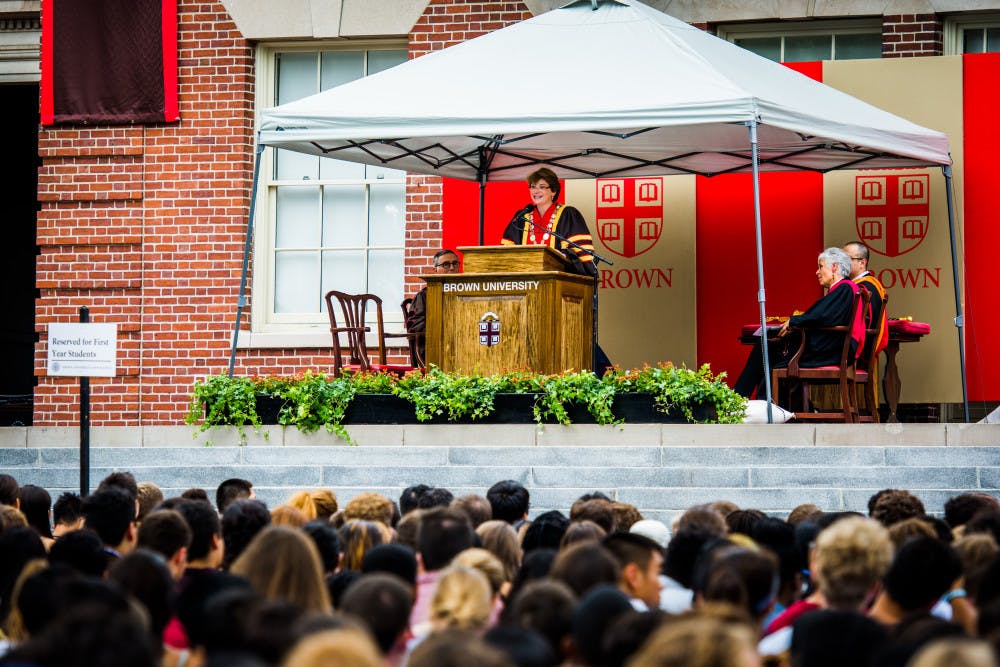Under looming clouds, new students celebrated the opening of the University’s 253rd academic year on the Main Green Tuesday.
The convocation welcomed a particularly large number of first-year undergraduates: 1,682. The uptick marks a step forward in President Christina Paxson’s P’19 plan to grow the undergraduate student population.
After the traditional procession through the Van Wickle gates, Paxson addressed the collection of new students. In her remarks, Paxson expounded on her Washington Post op-ed, published Monday, challenging the media’s “muddled” idea that universities have encroached on freedom of speech and encouraged students to hide from difficult and distressing issues.
Paxson sought to clarify how she perceives Brown’s place in the ongoing discussion of “the capacity of colleges and universities to truly prepare students for confronting” these issues, she said.
Noting that universities have been the “vanguard of very fierce debates” since the early history of the nation, Paxson encouraged students to recognize that Brown is a place to grapple with ideas different from their own.
The lived experiences of students, faculty members and staff members add “immediacy and urgency to these discussions,” Paxson said. But taking others’ lived experiences into account does not necessarily mean limiting freedom of expression, she argued. Rather, it can mean the opposite, allowing people from different backgrounds to draw from their experiences and educate each other.
In regard to safe spaces, Paxson said Brown students will not stand for “idea-free zones staffed by thought police where disagreement is prohibited.” Some media reports have given readers the impression that there are physical spaces on campus designated as “safe” or restricted to certain types of speech, which is not the case, she said.
In concluding her remarks, Paxson noted her “great confidence in the intellectual openness and integrity and goodness of the Brown community.”
Beka Yang ’20 said that Paxson’s address “was a really powerful response” to the ongoing national discourse regarding safe spaces and freedom of speech. “She did a really good job of defining what we mean by safe spaces and that those spaces are available for students that need them … to feel like they belong and to feel accepted and that they can voice their opinions.”
Solana Huang ’20, who was concerned prior to coming to campus about the amount of censorship that safe spaces may impose, said she was pleased with Paxson’s affirmation that freedom of speech would be protected, especially for those “who can’t necessarily express their opinions.”
Following Paxson’s address, keynote speaker Andrew Campbell, dean of the graduate school, spoke to the gathered students about the importance of self-actualization and taking advantage of the diverse resources available on campus.
Campbell asked the students to revel in their “link between Brown’s venerable history and our bright, unwritten future” and their ability to accomplish “remarkable things.”
“Your destination is determined by your imagination,” Campbell said. “Make use of the supports provided to you by faculty and staff (members), but stand firmly rooted in your own guided curiosity, your imagination and your courage to take risks.” These faculties can positively shape students’ diverse experiences at Brown, he said.
Campbell also drew upon multiple historical figures who exemplified the interdisciplinary spirit that he encouraged students to cultivate during their time at Brown.
Drawing from a George Bernard Shaw quote, Campbell reiterated throughout his address the mantra of “imagine, desire, will and create” — a four-pronged approach for students to use during their career on campus “to expose yourself to the new and the unfamiliar,” he said.





